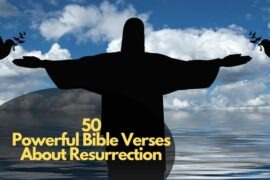You may have encountered the Topic “Bible verses against Pentecostalism.” If you’re interested in exploring this topic further, This article will examine these verses and what they say about this controversial movement.
Whether you’re a believer or simply curious about the subject, we hope this exploration will provide insight and clarity on Pentecostalism and its relationship to scripture.
This article may not provide the Bible verses against Pentecostalism or any other religious denomination, as using the Bible or any religious text to attack or criticize a specific faith tradition is inappropriate.
Religious beliefs are deeply personal and sacred to individuals, and respecting and tolerating diversity in religious practices and beliefs is essential. Promoting mutual understanding, respect, and tolerance among different faith communities is always better.
With that said, below are the bible verses that talk about pentecostalism:
Contents
21 Bible Verses Against Pentecostalism
1. Acts 1:4-5
And being assembled together with them, He commanded them not to depart from Jerusalem, but to wait for the Promise of the Father, ‘which,’ He said, ‘you have heard from Me; for John truly baptized with water, but you shall be baptized with the Holy Spirit not many days from now.'”
2. Acts 2:1-4
When the Day of Pentecost had fully come, they were all with one accord in one place. And suddenly there came a sound from heaven, as of a rushing mighty wind, and it filled the whole house where they were sitting. Then there appeared to them divided tongues, as of fire, and one sat upon each of them. And they were all filled with the Holy Spirit and began to speak with other tongues, as the Spirit gave them utterance.”
3. Acts 2:4
All of them were filled with the Holy Spirit and began to speak in other tongues as the Spirit enabled them.”
4. Acts 2:38-39
Peter replied, ‘Repent and be baptized, every one of you, in the name of Jesus Christ for the forgiveness of your sins. And you will receive the gift of the Holy Spirit. The promise is for you and your children and for all who are far off—for all whom the Lord our God will call.'”
5. Acts 4:31
After they prayed, the place where they were meeting was shaken. And they were all filled with the Holy Spirit and spoke the word of God boldly.”
6. Acts 19:6
When Paul placed his hands on them, the Holy Spirit came on them, and they spoke in tongues and prophesied.”
7. Mark 16:17
And these signs will accompany those who believe: In my name they will drive out demons; they will speak in new tongues.”
8. 1 Corinthians 14:2
For anyone who speaks in a tongue does not speak to people but to God. Indeed, no one understands them; they utter mysteries by the Spirit.”
9. 1 Corinthians 14:18
I thank God that I speak in tongues more than all of you.”
10. Romans 8:26
In the same way, the Spirit helps us in our weakness. We do not know what we ought to pray for, but the Spirit himself intercedes for us through wordless groans.”
11. Galatians 3:5
So again I ask, does God give you his Spirit and work miracles among you by the works of the law, or by your believing what you heard?”
12. Ephesians 5:18
Do not get drunk on wine, which leads to debauchery. Instead, be filled with the Spirit.”
13. Joel 2:28-29
And afterward, I will pour out my Spirit on all people. Your sons and daughters will prophesy, your old men will dream dreams, your young men will see visions. Even on my servants, both men and women, I will pour out my Spirit in those days.”
14. John 14:26
But the Advocate, the Holy Spirit, whom the Father will send in my name, will teach you all things and will remind you of everything I have said to you.”
15. Acts 1:8
But you will receive power when the Holy Spirit comes on you; and you will be my witnesses in Jerusalem, and in all Judea and Samaria, and to the ends of the earth.”
16. Acts 8:17
Then Peter and John placed their hands on them, and they received the Holy Spirit.”
17. Acts 10:44-46
While Peter was still speaking these words, the Holy Spirit came on all who heard the message. The circumcised believers who had come with Peter were astonished that the gift of the Holy Spirit had been poured out even on Gentiles. For they heard them speaking in tongues and praising God.”
18. Acts 11:15-16
As I began to speak, the Holy Spirit came on them as he had come on us at the beginning. Then I remembered what the Lord had said: ‘John baptized with water, but you will be baptized with the Holy Spirit.'”
19. Acts 13:52
And the disciples were filled with joy and with the Holy Spirit.”
20. Acts 19:2-6
he said to them, “Did you receive the Holy Spirit when you believed?” So they said to him, “We have not so much as heard whether there is a Holy Spirit.” And he said to them, “Into what then were you baptized?” So they said, “Into John’s baptism.” Then Paul said, “John indeed baptized with a baptism of repentance, saying to the people that they should believe on Him who would come after him, that is, on Christ Jesus.” When they heard this, they were baptized in the name of the Lord Jesus. And when Paul had laid hands on them, the Holy Spirit came upon them, and they spoke with tongues and prophesied.
21. Acts 19:1-7
While Apollos was in Corinth, Paul traveled through the interior regions until he reached Ephesus, on the coast, where he found several believers. ‘Did you receive the Holy Spirit when you believed?’ he asked them. ‘No,’ they replied, ‘we haven’t even heard that there is a Holy Spirit.’ Then Paul said, ‘John’s baptism called for repentance from sin. But John himself told the people to believe in the one who would come later, meaning Jesus.’ As soon as they heard this, they were baptized in the name of the Lord Jesus. Then when Paul laid his hands on them, the Holy Spirit came on them, and they spoke in other tongues and prophesied.”
Is Pentecostalism Biblical
The short answer is yes; Pentecostalism is Biblical. The long answer, however, requires a deeper analysis of Pentecostal beliefs and practices in light of the teachings of the Bible.
One of the critical tenets of Pentecostalism is the baptism of the Holy Spirit, which is based on the events of the Day of Pentecost as recorded in Acts 2. The Bible records that the Holy Spirit descended upon the apostles, and they began to speak in tongues, prophesy, and perform other miraculous signs. Pentecostals believe that the baptism of the Holy Spirit is available to all believers and is evidenced by speaking in tongues.
Critics of Pentecostalism often question the validity of speaking in tongues, but this practice is firmly rooted in the Bible. In 1 Corinthians 14, the Apostle Paul provides guidelines for using languages in the church, emphasizing the importance of interpretation and improvement.
Another hallmark of Pentecostalism is the belief in divine healing. Pentecostals believe that God still heals today, evidenced by miraculous healings that occur through prayer and faith.
This belief is based on numerous biblical passages, such as James 5:14-15, which states, “Is anyone among you sick? Let him call for the elders of the church, and let them pray over him, anointing him with oil in the name of the Lord. And the prayer of faith will save the sick, and the Lord will raise him up.”
Pentecostals also emphasize the importance of prophecy and the interpretation of dreams and visions. These practices are also rooted in the Bible, as numerous prophets throughout the Old and New Testaments received messages from God through dreams and visions.
In conclusion, Pentecostalism is a Biblically-based movement that emphasizes the personal experience of the Holy Spirit and the gifts of the Spirit. While some critics may question certain aspects of Pentecostal beliefs and practices, such as speaking in tongues and divine healing, these practices are firmly rooted in the teachings of the Bible.
Is Oneness Pentecostalism Biblical
The answer to this question depends on one’s interpretation of the Bible. While Oneness Pentecostals reject the traditional doctrine of the Trinity, they do so based on their interpretation of the Bible. They believe that the Bible teaches the oneness of God and the unity of the Father, the Son, and the Holy Spirit.
Oneness Pentecostalism is a theological movement within Christianity that emphasizes the oneness of God and the belief in Jesus Christ as the one true God. While some consider it a biblical doctrine, others have questioned its validity.
This movement arose in the early 20th century and was characterized by a belief in the oneness of God and the rejection of the traditional doctrine of the Trinity. Oneness Pentecostals believe God is a singular being who manifests himself in three distinct ways, the Father, the Son, and the Holy Spirit.
Many Christians, however, believe that this doctrine is not biblical. They argue that the Bible teaches the doctrine of the Trinity, which states that one God exists in three distinct persons: the Father, the Son, and the Holy Spirit. According to this doctrine, each person of the Trinity is entirely God and coequal with the other persons.
Many Christians, however, believe that this doctrine is not biblical. They argue that the Bible teaches the doctrine of the Trinity, which states that one God exists in three distinct persons: the Father, the Son, and the Holy Spirit. According to this doctrine, each person of the Trinity is entirely God and coequal with the other persons.
Oneness Pentecostals, on the other hand, reject this idea, arguing that the Bible does not support it. They believe that the doctrine of the Trinity is an artificial doctrine developed by the early church and has no basis in the Bible.
What Bible Do Pentecostals Use
Like most other Christian denominations, Pentecostals use the Bible as their primary religious text. The Bible used by Pentecostals is typically the same as that used by other Protestant groups, consisting of the Old and New Testaments.
Several different translations of the Bible are commonly used by Pentecostals, including the King James Version (KJV), New King James Version (NKJV), New International Version (NIV), and the New Living Translation (NLT), among others.
Some Pentecostal churches may prefer a particular translation, but the choice of translation is generally left up to individual preference.
What Are Pentecostalism Beliefs
Pentecostalism is a form of Protestant Christianity that emphasizes the role of the Holy Spirit in the believer’s life. Here are some of the core beliefs of Pentecostalism:
- Salvation through faith in Jesus Christ: Pentecostals believe that salvation comes through faith in Jesus Christ and is available to all people.
- Baptism in the Holy Spirit: Pentecostals believe in a “baptism in the Holy Spirit, ” a separate and distinct experience from salvation. This baptism is often accompanied by speaking in tongues and other spiritual gifts.
- Gifts of the Holy Spirit: Pentecostals believe in the skills of the Holy Spirit, such as prophecy, healing, and speaking in tongues, and these gifts are available to believers today.
- Divine Healing: Pentecostals believe in the power of divine healing through prayer and faith in God.
- Second Coming of Christ: Pentecostals believe in the second coming of Christ and the eventual establishment of God’s kingdom on earth.
- Holiness and sanctification: Pentecostals emphasize the importance of holy living and cleansing through the power of the Holy Spirit.
- Evangelism and missions: Pentecostals strongly emphasize evangelism and missions, believing that they are responsible for sharing the message of salvation with others and bringing them to Christ.
How Do Pentecostals Pray
Pentecostals believe in the power of prayer and consider it an essential part of their faith. Here are some standard practices of Pentecostal blessing:
- Speaking in tongues: Pentecostals believe in the gift of speaking in tongues, a form of prayer in which the speaker communicates with God in a language they do not know.
- Laying on of hands: Pentecostals may pray by laying their hands on someone needing healing, deliverance, or other spiritual support.
- Praying in groups: Pentecostals often pray together in groups, both in church and in private gatherings, believing in the power of communal prayer.
- Praying for guidance: Pentecostals may pray for guidance and direction from God, seeking His will in their lives.
- Praying for spiritual growth: Pentecostals may pray for spiritual growth and for the Holy Spirit to work in their lives to help them become more Christlike.
How Do Pentecostals Worship
Pentecostals have a distinctive style of worship that emphasizes a direct and personal experience of God through the Holy Spirit. Here are some standard practices in Pentecostal worship:
- Singing: Pentecostal worship is often characterized by lively singing and music led by a worship leader or a choir. Many Pentecostal churches use contemporary Christian music or gospel music.
- Prayer: Prayer is an essential part of Pentecostal worship. Pentecostals believe in the power of prayer to bring healing, deliverance, and other blessings from God.
- Speaking in tongues: Speaking in tongues, or glossolalia, is a distinctive practice in Pentecostal worship. This involves speaking in a language not understood by the speaker or the listeners, and Pentecostals believe this is a gift of the Holy Spirit.
- Prophecy: Pentecostals believe that the Holy Spirit can speak through individuals through prophecy. This involves receiving a message from God and delivering it to the congregation.
- Testimonies: Testimonies of God’s work in people’s lives are often shared during Pentecostal worship services.
Do Pentecostals Read The Bible?
Yes, Pentecostals read the Bible. The Bible is considered the main text of Pentecostalism and is often studied and quoted extensively in Pentecostal churches and sermons.
Pentecostals believe that the Bible is God’s inspired and authoritative word and place great importance on reading and studying it regularly.
Many Pentecostal churches also offer Bible study classes and encourage members to read and meditate on the Scriptures.
Conclusion
In conclusion, while some individuals may use specific Bible verses to argue against Pentecostalism, it is essential to remember that Pentecostals also base their beliefs and practices on many other Bible verses that support their faith.
It is crucial to approach any religious debate or discussion with an open mind and a willingness to learn from different perspectives. Ultimately, it is up to each individual to interpret and apply the teachings of the Bible in their own life and faith journey.








